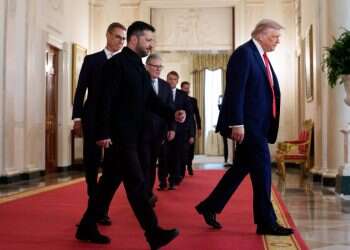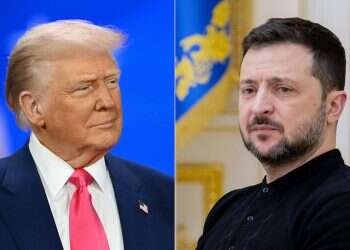A delegation of Israeli lawmakers and the Jewish Agency will visit the border crossings between Ukraine and Hungary this week, the Knesset said in a statement on Monday.
Follow Israel Hayom on Facebook, Twitter, and Instagram
The visit is part of Israel's Operation Immigrants Come Home, which is facilitating the mass aliyah (Jewish immigration to Israel) of Ukrainian Jews and their families fleeing the Russian invasion of Ukraine.
The delegation will include MKs Idit Silman (Yamina), Miri Regev (Likud), Evgeny Sova (Yisrael Beytenu), Vladimir Beliak (Yesh Atid), Yitzhak Pindrus (United Torah Judaism) and Haim Biton (Shas).
During the visit, the MKs will meet with Israeli staff from the Jewish Agency and its program, Nativ, which helps immigrants from the former Soviet Union reconnect with their Jewish heritage.
Before Wednesday's visit to the border crossings, the delegation on Tuesday is scheduled to visit the Jewish Agency's Aliyah Center in Budapest where they will meet with Jewish refugees who fled the war and are preparing to make aliyah to Israel.
A total of 273 refugees from Ukraine arrived in Israel on Sunday, with another 330 expected to land at Ben Gurion Airport on Monday.
Since the start of Russia's invasion, Israel has welcomed 5,856 immigrants from Ukraine.
Israeli medical teams on Monday left for Ukraine, where they will soon begin treating the victims of the war at a field hospital operated by Sheba Medical Center, in the town of Mostyska near the Polish border.
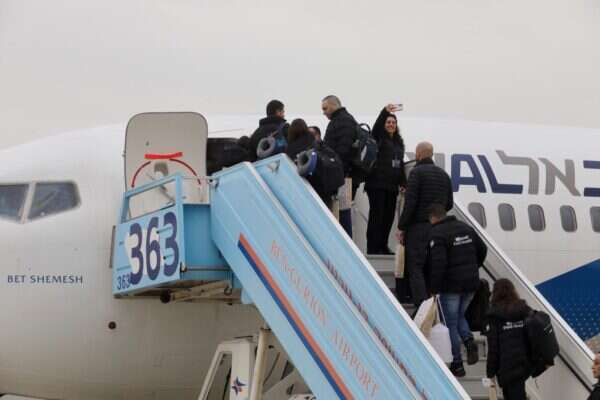
Prime Minister Naftali Bennett along with Foreign Minister Yair Lapid attended the official sending-off ceremony at Ben Gurion Airport.
"This is a very special morning. I'm very excited and happy to be here to bid farewell to the aid delegation that will establish a field hospital in western Ukraine… It's important for me to say: Israel has extended its hand to help in the crisis in Ukraine for several weeks, from the very first moment, on various and numerous horizons. We are managing this regretful crisis in a sensitive, generous, and responsible manner, while balancing the different considerations – and they are complex," Bennett said.
Meanwhile, EU foreign and defense ministers meet on Monday to discuss imposing further sanctions on Moscow, especially whether to introduce an oil embargo.
Trying to force a Russian military withdrawal from Ukraine, the European Union and its Western allies have already imposed a panoply of sanctions including freezing the Russian central bank's assets.
The humanitarian crisis in the port city of Mariupol, where residents are besieged with little food, water and power, is increasing pressure on European leaders to toughen sanctions on Moscow.
"It's unavoidable we start talking about the energy sector, and we can definitely talk about oil because it is the biggest revenue to Russia's budget," Lithuanian Foreign Minister Gabrielius Landsbergis said as he arrived at the Brussels meeting.
The credibility of the West was on the line, he said.
"We cannot get tired of imposing sanctions, we cannot get tired of bringing assistance and help to Ukraine," he said
The Kremlin has so far not been moved to change course in Ukraine by four rounds of EU sanctions imposed over the past three weeks, including on 685 Russians and Belarusians and on Russian finance and trade.
On Monday, the Kremlin said Europe would be hit hard in the event of an embargo on Russian oil, striking the continent's energy balance, but that it would not affect the United States.
Kremlin spokesperson Dmitry Peskov told reporters the question of any oil embargo was a very complex topic.
A fifth-round of sanctions will include adding more names to the EU blacklists. But the economically toughest choice is whether to target Russian oil, as the United States and Britain have done, given the 27-nation EU's dependence on Russian gas for energy.
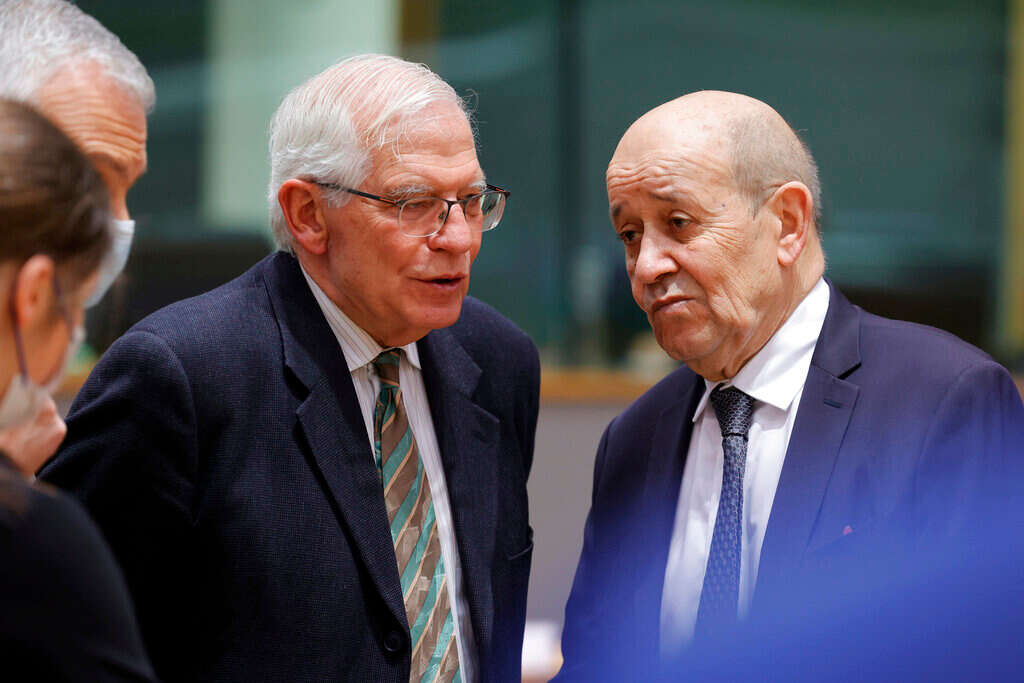
Diplomats told Reuters that Baltic countries including Lithuania are pushing for an embargo as the next logical step, while Germany is warning against acting too quickly because of already high energy prices in Europe.
Russia invaded Ukraine on Feb. 24. Putin has called Russia's actions a "special operation" meant to demilitarize Ukraine and purge it of what he sees as dangerous nationalists. Ukraine and the West say these are baseless pretexts for an aggressive war.
Diplomats have said a Russian chemical weapons attack in Ukraine, or a heavy bombardment of the capital Kyiv, could be a trigger for an energy embargo.
Moscow itself has warned that EU sanctions on Russian oil could prompt it to close a gas pipeline to Europe.
For now, the EU, which relies on Russia for 40% of its gas, with Germany among the most dependent of the EU's large economies, is divided on how to tackle the energy issue.
France, which heads the EU's six-month presidency, could prove crucial.
French President Emmanuel Macron has said that if the situation worsens even further in Ukraine – where thousands have been killed, millions displaced and some cities devastated by shelling – there should be no "taboos" in terms of sanctions.
Defense ministers will also discuss a "strategic compass," the closest thing the EU would have to a military doctrine, to adapt to a new geopolitical reality.
Pope Francis, continuing his implicit criticism of Russia, called the conflict in Ukraine an unjustified "senseless massacre" and urged leaders to stop "this repugnant war."
"The violent aggression against Ukraine is unfortunately not slowing down," he told about 30,000 people in St. Peter's Square for his weekly Sunday address and blessing.
"It is a senseless massacre where every day slaughters and atrocities are being repeated," Francis said in his latest strong condemnation of the war, which has so far avoided mentioning Russia by name.
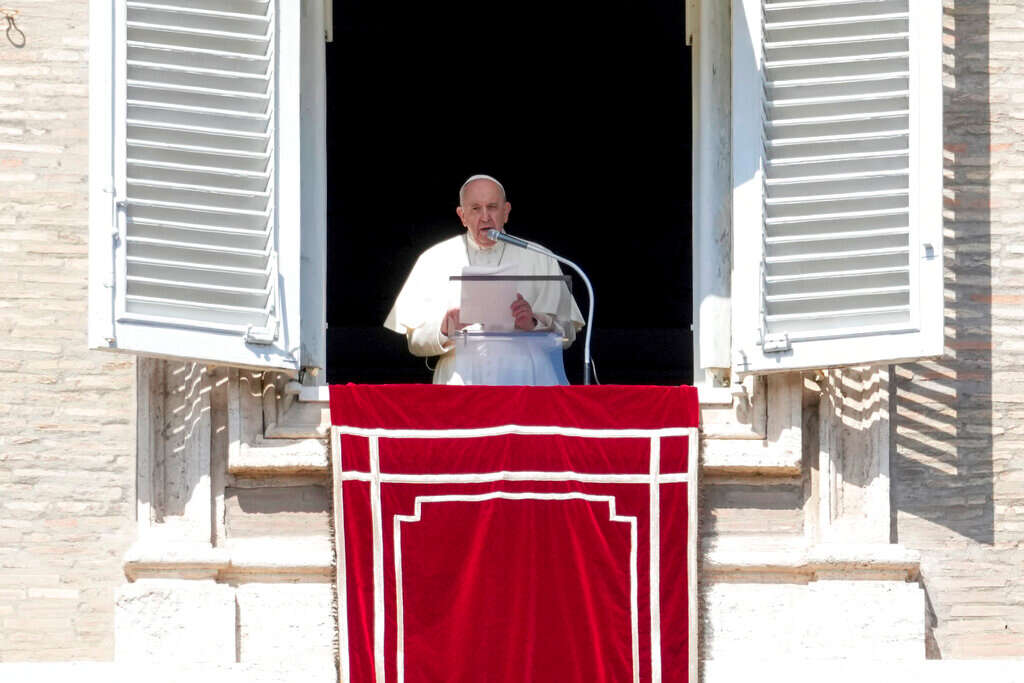
"There is no justification for this," he added.
"I beg all the players in the international community to truly commit themselves to stopping this repugnant war," the pope said, drawing loud cheers and applause from the crowd.
"Even this week missiles and bombs hit civilians, the elderly, children and pregnant mothers," he said.
Francis spoke about his visit on Saturday to a Rome hospital that is treating children wounded in Ukraine.
"One was missing an arm and another had a head wound," he said.
Francis also asked people to guard against the potential human trafficking of those fleeing Ukraine.
Subscribe to Israel Hayom's daily newsletter and never miss our top stories!
"Let's think about these women, these children ... who are without work, separated from their husbands. They will be sought by the 'vultures' of society. Please. Let's protect them," he said.
Poland has seen indications that human traffickers may be targeting refugees fleeing the Ukraine war, officials and aid workers have said. Some preventative efforts have been put in place.
The city of Berlin has warned Ukrainian refugees not to accept offers of money or accommodation at the main train station due to concerns that they might be lured into forced prostitution or other forms of human trafficking.

Also in Berlin on Sunday, some 10,000 people attended a concert in solidarity with Ukraine, police said, with the crowd waving Ukrainian flags or holding banners with slogans opposing the Russian invasion.
Gathering near the Brandenburg Gate, a symbol of a divided Germany during the Cold War, many performers on the stage wore shades of blue and yellow, the colors of the flag. Musicians included Natalia Klitschko, a Ukrainian singer who is married to the mayor of Kyiv, Vitali Klitschko.
Jamala, a Ukrainian singer who won the Eurovision Song Contest with her song "1944" in 2016, was broadcast via videolink on a big screen, telling attendees that "music is a peaceful force."
i24NEWS contributed to this report.


